I lived in Central Illinois when I was raising my children. We were lucky enough to live near Arthur, where an Amish community dotted the farmland surrounding the city itself with their white sprawling houses. Decades ago, when I first started keeping exchange students and my children were three and nine, there was a field trip to Arthur where the host families and students got to visit the Amish-owned stores and learn about the culture and even ride in the buggies. One store was a rickety old building in the back of a large white house. It was a woodworking store owned by Mr. Schrock. Among other things, he made small wooden toys, paper towel and napkin holders, puzzles, and a curved device for holding bananas in the air to keep them fresh. It was a perfect place to stop and buy a souvenir.
My family and the Schrocks hit it off from the beginning, so we started visiting them on our own. My children were polite, curious and asked good, respectful questions. Mr. Schrock had a great sense of humor, too, and once they discovered that, it was all fun and games. He often gave little Krystle some trinket from his shop and a game or puzzle for Nathaniel. Then we started to be invited into the house for coffee and pie, and a miracle occured: we became a part of the family, an unusual thing in the Amish world.
Once, while we were all in the kitchen having pie and coffee, a carload of tourists drove up to the little shop. Mr. Schrock started to get up, but he had just sat down for his refreshments, so I said, “I’ve got this,” and headed to the shop. There was a family consisting of grandparents, parents and two children. They took their time choosing what to buy, asking a lot of questions that I could answer from the many times we’d been there. Finally, they made their purchases by giving me cash, which I placed in a cigar box and then wrote the purchase in a spiral notebook with the pencil attached by a string.
When the little boy made his purchase he looked me over and asked “Are you Amish?”
A wee devil sat on my shoulder and a twinkle entered my eye and I answered, “Yes, I am.”
“Ohhhhh,” said the boy doubtfully, probably having previously seen the Amish ladies in their long dresses, aprons and bonnets coming and going on the drive through town.
The wee devil prodded me. “Do you know how to tell?” I asked, pointing to my long blue and yellow striped fingernails. “It’s all in the fingernails,” I said and winked.
The adults were, thankfully, laughing as they took the confused boy to the car. When I got back to the others I boasted about making sales, but didn’t confess my orneriness.
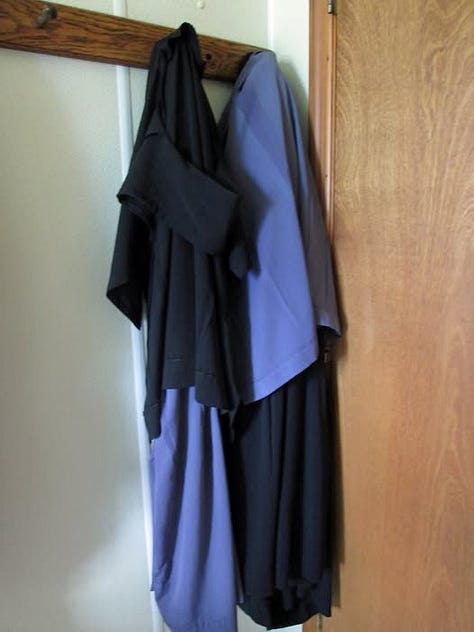
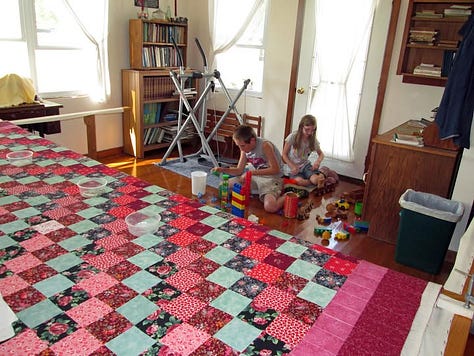
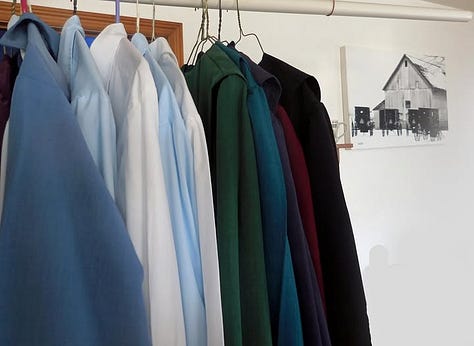
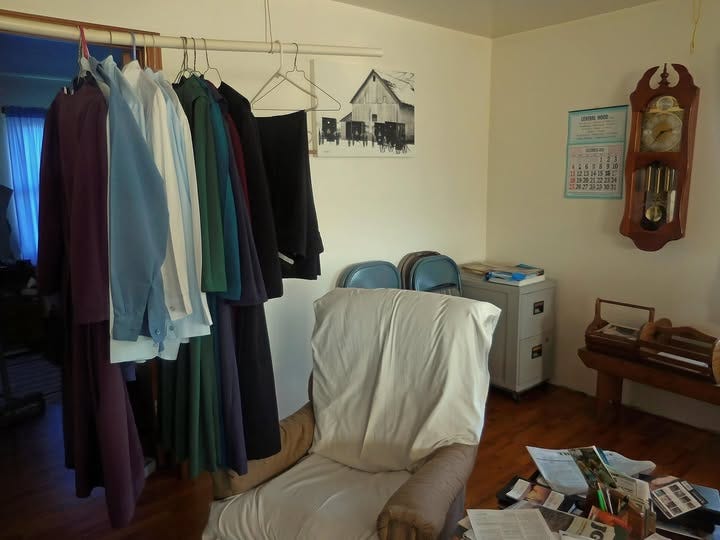
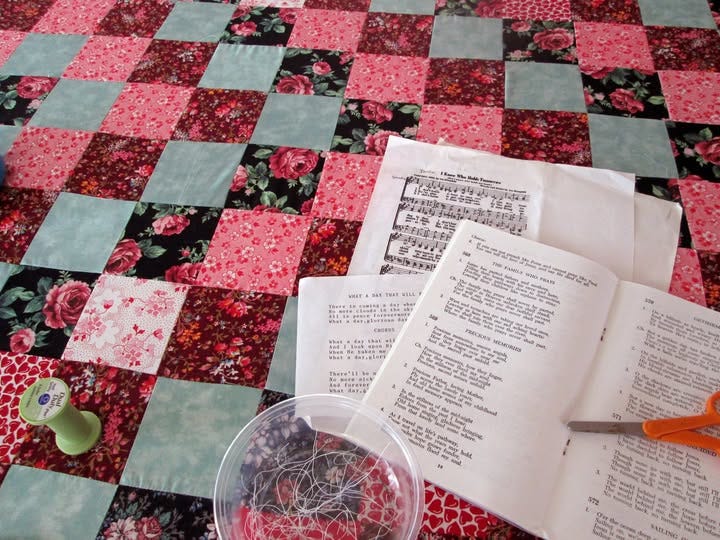
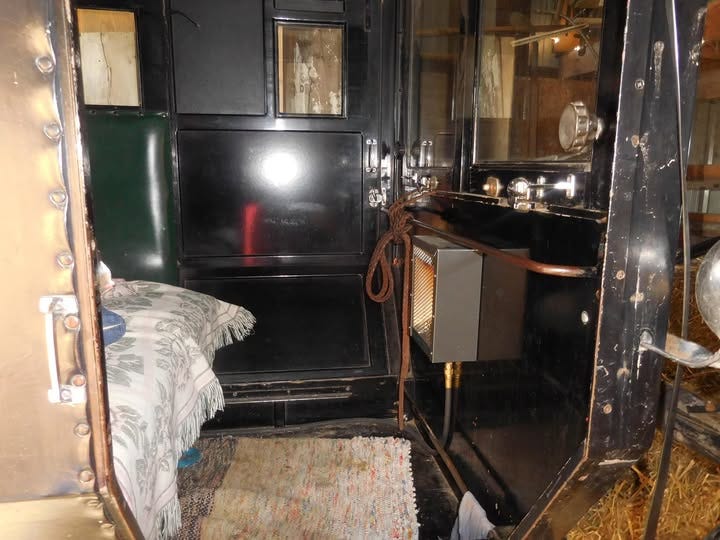
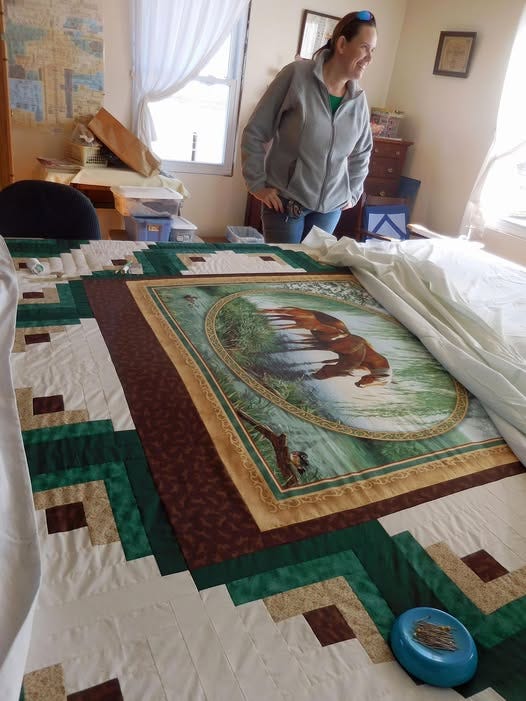
After we became a part of the family, Krystle started spending weekends now and then with the Schrocks, always running up to Mrs. Schrock, who would stand behind her and mindlessly braid her hair if Krystle didn’t have it tied back in some fashion. The day we really knew were were part of the family is when we visited shortly after their daughter gave birth and was staying with them so her mother could look after her. I asked if I could go in and say hello to Margaret and the baby, and Mrs. Schrock said that would be fine.
My husband started to follow, and I stopped him, explaining, “No. Her hair will be down.”
Mrs, Schrock said, “Oh, that doesn’t matter with family.”
Every time I think of that that day, I get tears in my eyes. In fact, I’ve got them now as I write.

The subject of photos came up early in the relationship because I’ve always taken copious amounts of photos, as did my exchange students. The Amish are not to be recognized in photos, considering it a “graven image,” about which the Bible warns.
When I asked about it, Mr. Schrock stroked his long, scraggly beard, as he always did when he was thinking, and said, “Well, now, I think if we don’t know you’re taking them, we wouldn’t be breaking any rules.”
So we were able to surreptitiously take pictures from the side or behind. The full face one at the beginning of this article was taken by my grandson with his cell phone with special permission from Mrs. Schrock. Our dearest Mr. Schrock was very ill and she knew it would likely be the last time we saw him. I also suspected she wanted such a picture for herself to remember him by, so I sent it to her.

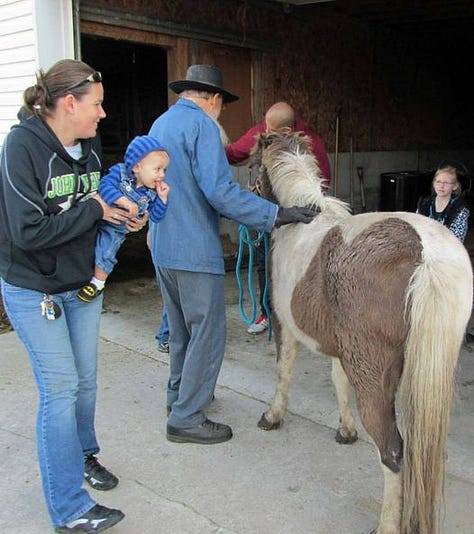
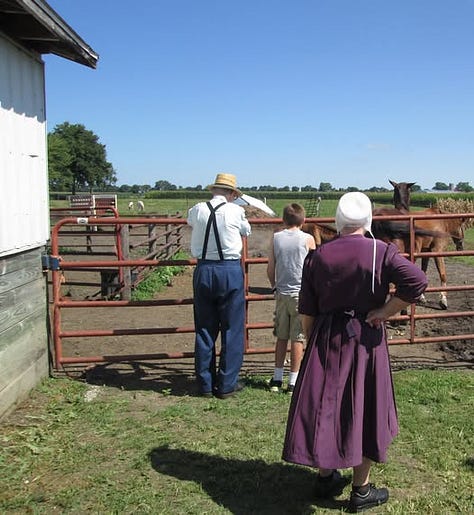


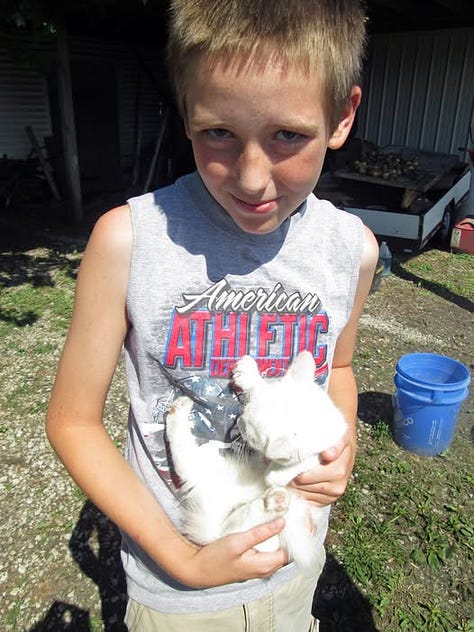

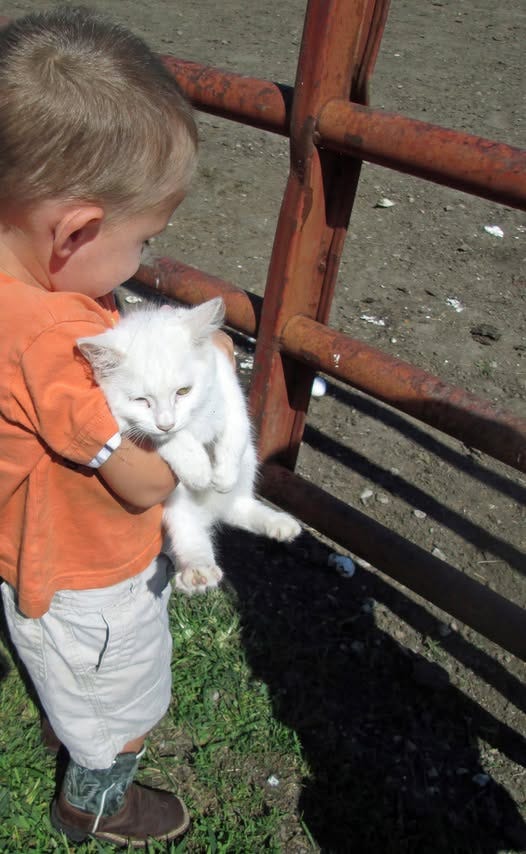
On September 11, 2001, Krystle, now a teenager, and I felt terrorized at the attacks on our country, as did most of the world.
We didn’t feel safe, so I said, “Let’s go to Arthur. It will feel more peaceful there.”
We never had a way of letting them know we were coming because they had no phone, but we were welcome any time. We just showed up and, before the wheels to the car stopped, they’d be out to greet us. On this day, it seemed they were expecting us.
I asked, “Did you hear what happened?” which seems like a silly question unless one understands how isolated the farm was.
Mr. Schrock brought out a postcard of the Twin Towers that I had sent them, written from a restaurant atop the towers when our family was there the previous summer.
“Is this what they’re talking about?” he asked, pointing to the Towers.
We sat and discussed the evils of the world. We had all the same questions, but none of the answers. But we were together and Krystle and I went home feeling better.
Years later, in 2006, when Krystle had children of her own, there was an unspeakable tragedy in the Amish community. An English (term for non-Amish) man from the community shot and killed eight girls and wounded four others at an Amish schoolhouse in Pennsylvania before killing himself. We went to visit them as soon as we heard the news to see if we could be of any comfort to them. As we sat discussing the event and its repercussions in the Amish communities across America, we talked of the outpouring of mercy and grace the Amish were showing to the shooter’s family.
"We must not think evil of this man,” one Amish man said.
The community surrounded the killer’s widow, children and parents with comfort and sympathy. We discussed this. The Amish are strictly pacifists and are not even supposed to defend themselves or another. I asked Mr. Schrock about the feasibility of obeying that in a situation like this.
“Would you,” I asked, “have been able to stand by and do nothing if you had the means to defend those children in some way? If someone broke into this home and tried to hurt Viola, could you just stand by?”
This time, he stroked his beard for a good long time before answering, “I wouldn’t be meant to. I’m not sure what I would do, but I wouldn’t be meant to.”
That sounded like a man who would have considered breaking the rule.
Yes, we shared our sorrows and tragedies, but mostly we shared laughter. Mr. Schrock would rock back and forth in his chair, slapping his knees with his head thrown back in laughter. The laughter was never far away; I knew it from the twinkle in his eye. I teased him mercilessly and he loved it. And I used this great sense of humor to introduce ideas to him that would make his wife’s life more comfortable, things about which she would never speak up. That’s how we get to the window.
One day, I needed what I called an “Arthur fix,” so I drove out to go to Beachy’s Bulk Foods store, a chef’s dream with every spice, sauce, grain, and bean known to humankind and, of course, visit the Schrocks.
When I got to the Schrocks, there were several buggies there. I caught my breath in fear because this can signal bad news. I approached the the house warily and came in by the back where I saw a group of men building an add-on. Spotting Mr. Schrock among the hats and long beards, I asked what they were doing. He said they were adding a laundry room for Mrs. Schrock, a thoughtful idea. They were nearly done with the new little room so I had a look around in the darkness of winter twilight.
I asked, "Where are you going to put a large window?"
The men stopped bustling about and looked at me as if I asked when the strippers were going to show up.
He said, "I hadn't figured on putting in a window.”
“But why not?” I asked, sincerely curious why the would leave a blank wall in a room that would be only dimly lit by a propane fixture in the ceiling.
“That's more work and cost something."
“Are windows so very expensive?” I countered.
I sighed and said, "Edwin, do you do the laundry?"
He admitted he did not.
I said, with a twinkle in my eye, "But you dirty the laundry and I think you get your shirts badly stained when you work. How is Viola supposed to see those stains in this dark room? Do you want to go around in dirty shirts while making your wife work harder than she needs to?"
He laughed, turned to the other men and said, "Well, I'm thinking we'll be putting in a window.
This decided, one of the men said he had one at home just sitting in his barn. It had turned out to be the wrong size when he bought it. He offered to go get it.
Feeling victorious, I joined the proper ladies in the living room and said, “Guess what, Viola? How would you like a window in your new laundry room?”
“Why, of course I would, but I don’t think there’s plans for one.”
“Well there is now,” I beamed, thrilled with my gift for my friend. “I talked Edwin into it. And someone had one at home he’s gone to get.”
The ladies put down their sewing and stared at me, the Schrock’s pet English person, had ducked into a nearby laundry room and was now Superwoman. One of them quipped, “Could we all rent you out to get our husbands to do the things they should?”
We all laughed and joked about how a pet English person like me could be a handy thing to have around in their community, while the men installed a big beautiful window.
Krystle, the grandkids, my best friend and I went to see the Schrocks during COVID in October of 2020. Mr. Schrock was failing badly. He had Alzheimers, but still knew us. It would have broken my heart if he had not. I knew it would be the last time we would see each other because I was moving to Portugal soon and there would be no more drives to Arthur. I could hardly take my eyes away from their beloved faces, searing them on my heart and brain, fiercely thankful for the special dispensation of the photographs.
We had been in Portugal for only 10 days when the Schrock’s English son emailed me to tell me that his father had passed. Brokenhearted, Krystle went to her Amish grandfather’s funeral with her daughter Lily, who had also grown up visiting the Schrock farm. Other than the Schrock’s English sons and their families, Lily and Krystle were the only English people there. An Amish funeral is an imposing things, particularly for someone so beloved in the community. There will be fields full of black buggies huddled together as if sharing the mourning. The service, in German, lasted two and half hours, while people shot wondering glances at the two English women who were clearly bereft.
Krystle posted on Facebook, “The best part was seeing the Amish and “English” family members hugging around the casket. Edwin and Viola never shunned their children after they left the faith.”
Krystle pegged it. The Schrocks were all about mercy and grace. Never in our nearly 40 year friendship did I hear them criticize another person nor judge anyone. Never even a harsh word. I’m sure they had their opinions, they were human, afterall, but they controlled their words and their hearts. No wonder we ran away to Arthur during life’s stresses. Being with the Schrocks was like a vacation away from all that was rough and wrong and hurtful. We were blessed to have known them and to be adopted into their family.
Tribute to Mr. Schrock from Krystle: “My dear, dear Amish Grandfather, you will be greatly missed!! You have been a part of my life since I was 4. You have been there since day one with my kids. From baby Seth trying to rip the bunny’s head off to Lily finding her love of horses to Dane playing with your great grandkids, you were family. Thank you so much for letting us sneak photos throughout the years. I loved you like my own family. Rest In Peace.”




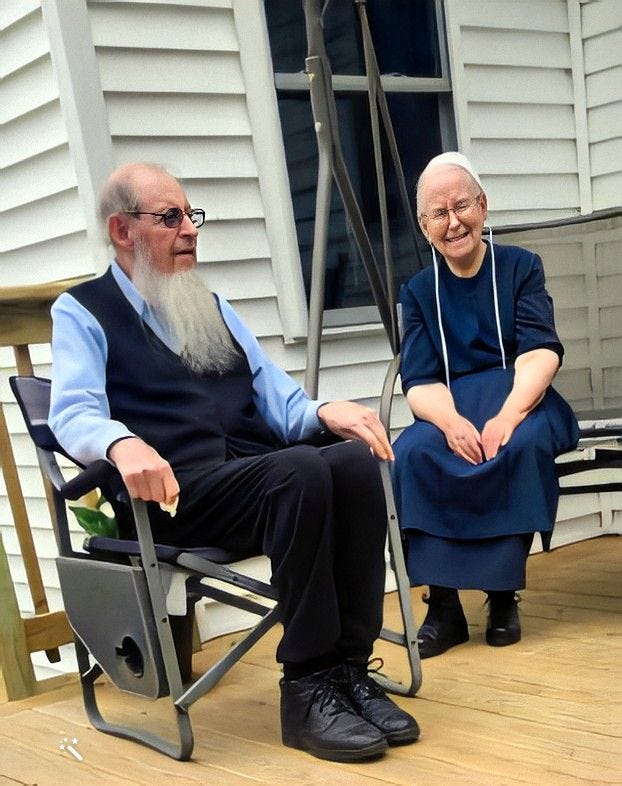





Lovely, and how fortunate you are to have been part of the family.